Wednesday, April 21, 2010
Saturday, October 13, 2007
Regula's Joy of Movement
I have opened my new studio. Please see http://RegulasJoyOfMovement.com.
Maybe these keywords help me get found?
Yoga Wilmette
Pilates Wilmette
Feldenkrais Wilmette
Body Rolling Wilmette
Friday, December 31, 2004
Humanist Community Schools tip jar
Click here to donate
From September - December 2004, we raised money for the Chasanga and Revival Humanist Community Schools in Zambia. As an update (January 2005), both schools have advanced with our help.
The Chasanga Community School was able to finish one school building. With the help of the community, they made bricks to build the walls. They built two primative toilets as a temporary solution but need help to install at least one toilet with plumbing to qualify for further assistance from the Ministry of Education and UNICEF. Each toilet is $175 and ideally they would have two. $350 total.
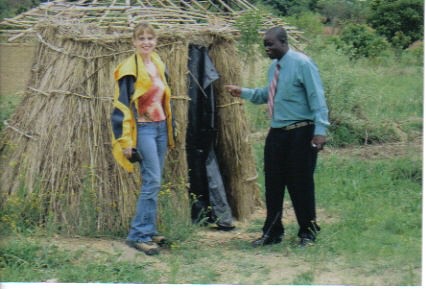
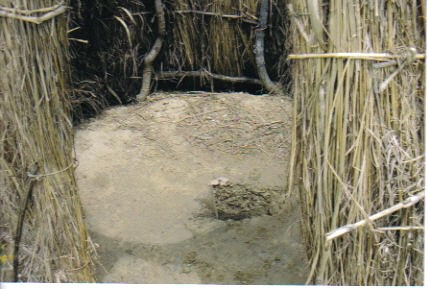 | Temporary
Primative Toilet |
The Revival School increased from 214 students to 310 students and was able to lay a foundation for an additional classroom. They continued their relationship with the World Food Organization to receive one meal a day. They've also partnered with UNICEF (books, materials and desk) and the Zambian Community Schools Organization (teacher training). The Zambian Ministry of Education has a program where they pay rent for community schools. So far, this assistance has not come through, but the rent of $60 per month is still due (and past-due). Adding the past due rent of $300 to the total for the next 6 months totals $660.
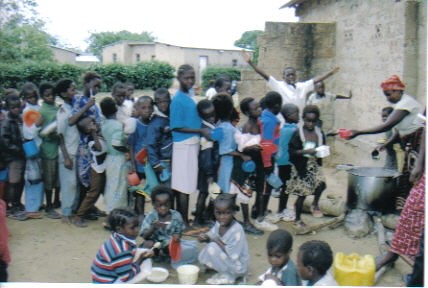 | children
receiving their one meal |
Click here to donate
Humanist Malaria Campaign tip jar
Click here to donate
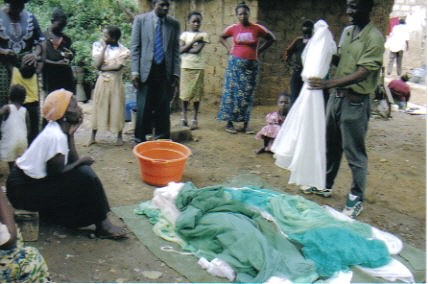 | James Chibuye (holding mosquito net) working with Humanist Community in Garden Compound (Zambia) impregnating the nets with insecticide, December 2004
|
Perhaps you already know that the years 2005-2010 are dedicated in the world to fight malaria. The volunteer humanist teams in Zambia (7 councils with over 3600 participants) and in Congo (6 councils with over 1100 participants) started this project in December 2003.
They started by educating their communities about what malaria is and how they can work as a community to prevent it by covering their windows, cutting the tall grasses, filling depressions where water can stand, and cleaning up the compounds. They have also created a census of the people in the households, paying particular attention to who's pregnant and how many children under 5 years of age live in the household. They connected to the clinic in their community to propose to work together by going home with the pregnant woman and overseeing the proper administration of the malaria medication received from the doctor as well as the installation of the mosquito net that each pregnant woman receives at low cost but often sells in the market to get food.
The African Humanist volunteers have also reached out to existing NGO programs, such as World Vision, and the United Nations to be registered as an organization working in the fight against malaria and to have the credentials to work with the clinics.
Even though all of this has been going on for one year, the humanists struggle to carry out the compound cleanups because of the lack of equipment (shovels, wheelbarrows, etc) and safety for cholora prevention (rubber boots, gloves, face masks, etc.
Your monetary contributions help these projects on the way to becoming self-sustained.
We are a US federal tax exempt organization.
Click here to donate
Humanist Agriculture Project in Congo tip jar
Click here to donate
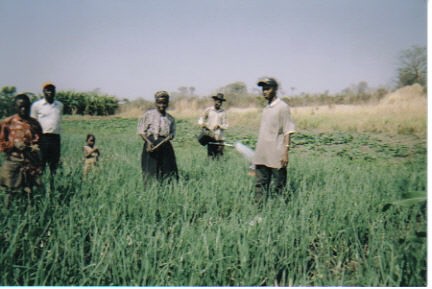 | Papy Ngoi (front right) with some of the humanist volunteers cultivating the onion field. |
Papy Ngoie, humanist volunteer, organized hundreds of people in Lubumbashi, Democratic Republic of Congo (formerly Zaire), to volunteer in an agriculture project.
They are growing onions and other produce. The humanist families consume some of the produce and then sell the rest in the local market. The money thus raised is then used for fertilizer.
They struggle to maintain the project due to lack of initial fertilizer as well as lack of irrigation system. Yields are currently too low to sustain fertilizer for future harvests.
The money raised in this campaign will provide that initial fertilizer that will allow yields to be high enough to then self-sustain. An irrigation system would allow the same number of people to cultivate more land and thus feed more people.
This dropcash effort is to raise $500 for fertilizer and $1000 to begin to build an irrigation system.
We are a US federal tax exempt organization.
Click here to donate
Wednesday, December 29, 2004
A toast to 2005 with "To Give and To Receive"
The writing below is from the Humanist book "Humanize the Earth". It moved me deeply the first time I read it though I did not want or rather I could not understand, far less comprehend it.The gentle, profound humour made me not reject it and now, I can only give it to you just like I did give it as the last personal work to the Africans in December 2004, knowing that you too will dare to to try to undersantd and apply what is written.
From my heart to yours, enjoy.
XV. To Give and To Receive
- Let us look at the relationship you establish with your external landscape. It may be that you consider all objects, people, values, and affections as things presented for you to choose among and devour according to your own particular appetites. It is likely that this centripetal vision of the world denotes a contraction that reaches from your thoughts to your muscles.
- If this is the case, it is certain that you will have the highest regard for everything that is related to you—your sufferings as much as your pleasures. It is doubtful that you will even want to surpass your personal problems, because in them you will recognize a tone that is, above all, your own. From your thoughts to your muscles, everything has been taught to contract, not to let go. Hence, even when you act with generosity, calculation motivates your apparent disinterestedness.
- Everything enters and nothing leaves, and from your thoughts down to your muscles everything becomes intoxicated.
- And having contaminated all those around you, how can you later reproach them for their “ingratitude” toward you?
- If we speak of “giving” and “helping,” you think of what others can give you, of how they can help you. But the best help that could be given you would consist of teaching you to let go of your contraction.
- I tell you that your selfishness is not a sin but rather the fundamental error in your calculation, for you have naively believed that to receive is better than to give.
- Remember the best moments in your life and you will recognize that they were invariably accompanied by a disinterested giving. Reflecting on this should by itself be enough to change the direction of your existence—but it will not suffice.
- Let us hope I have been speaking of someone else and not of you, since surely you have understood such sayings as “humanize the earth,” “open the future,” and “overcome suffering in the world around you,” all of which are based on the capacity to give.
- “To love the reality that you are building” does not mean to place the solution to your own problems as the key to the world.
- Let me end by saying: If you want to overcome your profound contradiction, you must produce valid actions. If these actions are valid, it is because they help those around you.
The incomprehensibly intangible 12/2004
Semester Report
June 2004 – December 2004
Regula Frey, G – Iota
The semester began with a big shift in my orientor (external and internal), a shift that, to be honest made me uncomfortable, at times angry. I could not understand how one human being can change so radically in such a short time. Yes, I did have lucid moments of comprehending that it was not really a radical change, rather a change that happened during the entire year of 2004. My orientor became much more flexible, not demanding any more. Though I liked the change, I was so used to the old ways of doing things so that the new clothes did not fit me in relationship to my orientor.
I really had a difficult time to find anything in my heart (or is it my mind?) that wanted to support her in the beginning. And, to tell you the truth, I did very little for some time with my structure, and could hardly think about going back to orient. What for? Just to … ?
Well, this is external about my orientor. I was actually just fighting my own changes that were bit to incomprehensibly intangible for me. I became more flexible, less demanding on myself and others. But, I did not know.
The way it showed itself was that I stayed in touch with the African structure only when it was necessary. I called a lot less frequently and only answered e-mails with structural context. Something big for someone like me who needs to be friends with everyone even with my worst enemy. In time, I could feel that this change of behaviour made me stronger, less entangled and less attached to nonsense.
When I did return to Zambia in September, I planned to relax a lot, not work 12 hour days, sleep in. And, I did. I planned less personal work and only had two extended weekly meetings. From there, I was able to give more equal attention to everyone, had decent frequentations, that means, I was more open to be curious about the other.
The projects had developed from June to September. One of the schools needed more attention since they got stuck in the process of going to the Ministry of Education. The orientor and I spent a day at the internet café writing a proposal which we then submitted together. That was big for me, since I struggled with internal judgments about this orientor whom I specifically showed how to write a proposal before I left in June. I know, I still heard those judgmental voices in me during our “internet proposal writing day”, yet I was more filled with compassion knowing this human beings predicament in her life… .
In the September trip to Africa, two Congolese orientors were invited to come work with their peers in Zambia. I only had met one of them two years ago, the other, I never had met. Working together was delightful and sobering. They quickly understood the theory of organization and were grateful to adjust their expanding structures the way it is suggested. Sobering it became to me when I saw that the one orientor who had come to work with me multiple times had failed to pass on to the first instance the manuals had been given and the personal work learning he had received. It made me realize that I need to stop giving too much energy to one person only, but make it equal to everyone.
For the purpose of configuring Coordinators, I bought each orientor a bound book to keep with him/her at all times and record the people who agree with us. But I did not have any expectations on them that they would use these books. I thought that one of the orientors for sure will use the book for designing his tailoring projects … . When I returned to the USA, I did stay in touch with the teams, but never really investigated to deeply about their “book keeping” /configuration.
Ted Ernst made a trip to Zambia in October and worked specifically with the Zambians and three Congolese on the fichas program. Upon on his return, I was still not clear inside myself who was doing what with the “books”/configuration.
I was surprised and not surprised when two of the orientors configured before my return trip in December. And they did it very well. This feeling makes me think or realize that I do lack a bit (just an exaggeration of the truth) of trust in them and myself that they can do it themselves and I undervalue the work that I do… (ok. that’s for the next time, I am not ready for this piece of digestion yet).
On the trip home, the three Congolese took a computer donation with them and they got into a car accident at the border which put them all for some time into the hospital. That was a pivotal experience for myself, because I was asked to pay for the hospitalization costs for all of three and even if I wanted to help felt I couldn’t since finances went to the trip and food expenses for their trip to meet Ted. I let go easily of the nagging, emotional commotion and just supported Congo with honest concern and interest. I sent the Ceremony of Well Being.
The December trip was scheduled as the shortest trip ever. I spent 6 days in Zambia, had not invited any Congolese to come and work together. I knew, I had to close the office at Cairo road that had opened in March since it was impossible to be self sustained. I had the strong thought of wanting to support my orientor for her configuration thou, I did not feel it yet. The thought was good enough.
It was good to see who all orientors stayed working together, connected. The had keep meeting very week and work mainly on the Principles and sharing their projects.
It was good to hear that the Malaria Campaign is still active in all compounds, some more then others. One women orientor whom I had not seen since march, had mobilized the clinic for the Malaria Campaign and received usage of the megaphone to activate people for the scheduled cleanups and with that expanded her team quite a bit. Another woman started to work with the Community Council, who does have gloves and facial protection for the clean ups.
It was good to visit two of the schools and observe not only the progress in three months, one school has 310 children enrolled now from 215 in September, but also their plan for the coming months, a plan that was presented to me like the design of an architects model home without asking finances to build the “model home”: the orientors of the schools fundraised in their community for donations to buy cement. With the help of community volunteers, the drew another classroom on the outside all of the school, dug a ditch into that drawing and filled it with cement, the foundation of the next classroom
Most orientors in Zambia and Congo meet every week for weekly meetings. The Zambians are trying to keep the office open until they find another place for meetings, The Congolese orientors meets at the church of a pastor who is a sympathizer.
The communication with the teams was good with the Congolese by computer, fair for the Zambians and with a few good by phone. When I mention good, I believe that many started to understand and have a different experience due to their action fronts. Before my departure in December, I put in place excellent communication between the orientors and myself for the coming semester(s).
From September to December, I worked on creating a cooperative, Joy Of Movement Humanist Centre. After the Cooperation got accepted, I worked on writing a 501c3 which got finished and legalized mid December. This process was a parallel process with fundraising in the USA and abroad and making a lot of new adherents. It is one of these adherents, a Swiss accountant who helped me with the paper work of legalizing and another adherents from Nevada, who invited me to work under her foundation’s name, to legally fundraise until I was accepted with Joy Of Movement Humanist Centre. It is also this six months process that brought Nathan Go, new Central administrator of G – Iota into the structure.
Sunday, September 19, 2004
opportunities to give
JOY OF MOVEMENT
HUMANIST CENTRE
Help others to build a meaningful reality and
“not even death will halt your flight.”
HUMANIST CENTRE
Help others to build a meaningful reality and
“not even death will halt your flight.”
Over the last 4 years, we have encouraged and helped projects of non-violence, non-discrimination and for human rights developed in Zambia and Congo DRC. Many of the projects turned into programs such as humanist community schools or organized compound cleanup to fight against malaria and cholera. The goal for these programs is to become self-sustained; the people in Africa learn how and where to obtain resources necessary for program sustainability. We have found in man cases these resources can be found in their own communities and country. It requires a lot of learning to write proposals and work with the institutions; a tall order for people on the grassroots level. But, they can and are doing it they just need a bit of help.
All programs are run by volunteers.
Your donation will allow the walls to be built, one meal per day, the construction of a toilet or the rent for the school and food-storage building which will allow these two schools to reach freedom to educate and feed the children.
Opportunity for Giving
Bricks for school walls
- $25- 25 bricks
- $50- 50 bricks
- $100- 100 bricks
- other $_______
- $25 1 week of food
- $50 2 weeks of food
- $100 one month of food
- other $______________
- $25 material
- $50 material and water pipes
- $100 toilet room
- other $________
- $25 2 weeks rental
- $50 one month
- $100 two months
- other $__________
Please make checks payable to Emerging Futures Foundations and mail to: Regula Frey, 340 Skokie Court, Wilmette, Illinois, 60091. All donations are tax deductible.
Shanti Community School
The Shanti Community School, in Chasanga, Zambia, built the frame for a school building and raised funds locally to put a metal sheet roof on the frame, but they have no bricks to build neither the walls nor the ability to build a toilet, both necessities to apply for government assistance. Also, the children do not have food.

Chasanga Revival School
The Chasanga Revival School in Zambia was able to work with UNICEF to get desks and one meal a day for 250 children, mainly orphans who attend the school. The school struggles to make rental payments of $50 per month for the school building and small food storage house, so they need our help until they find a donor in the country (or Africa at large) to work together.

first blog post
Welcome to my new blog! My plan is to use this website to keep you updated about what's happening with projects and programs in Zambia and Congo as they work towards becoming self-sufficient. If you would like to help us or get involed in any way, please leave a comment with your email and I'll contact you.

